
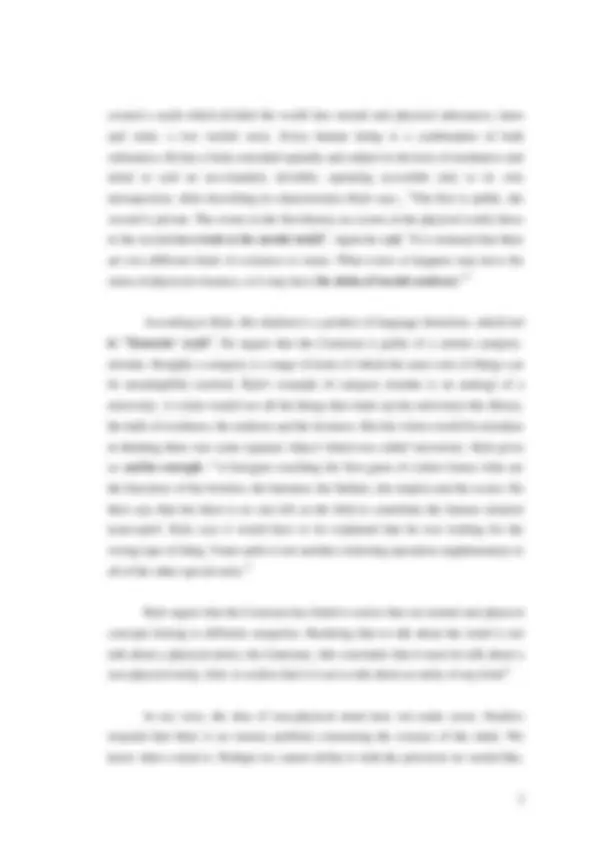
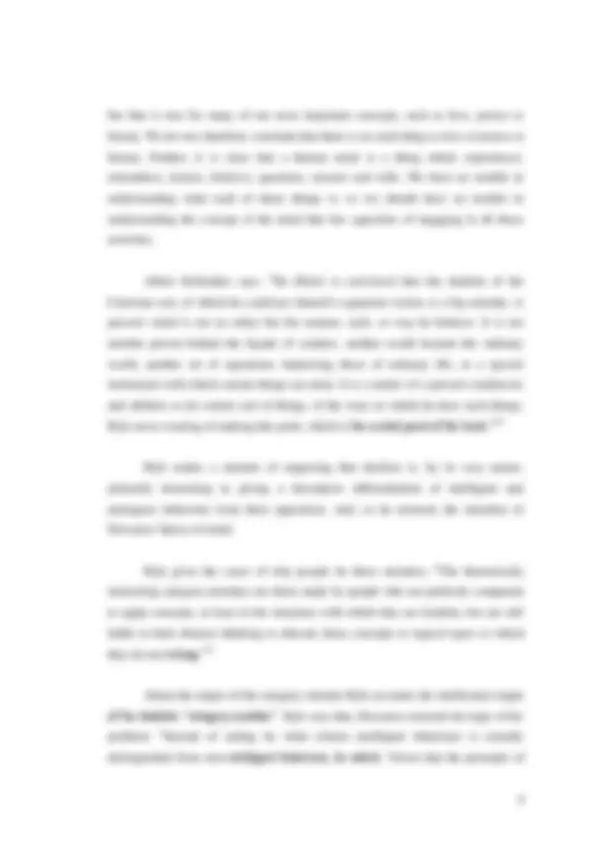
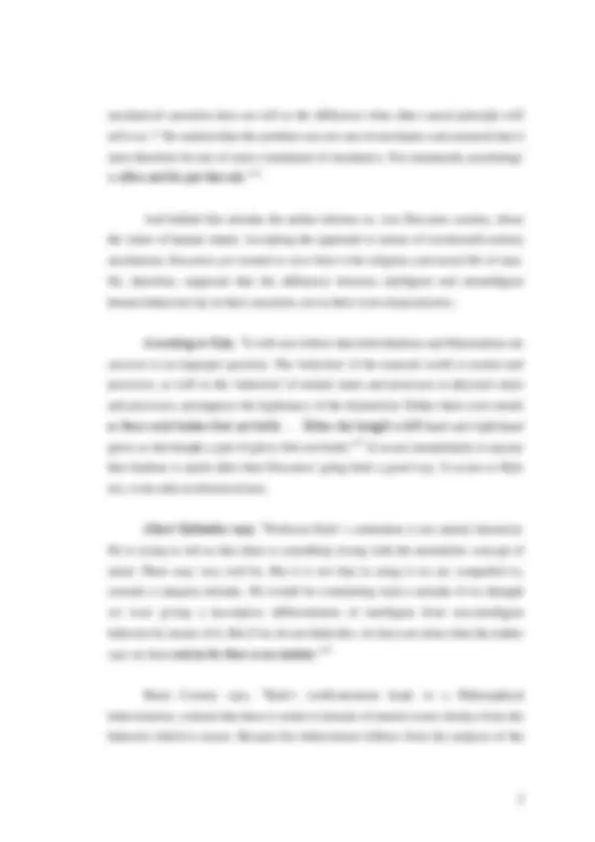
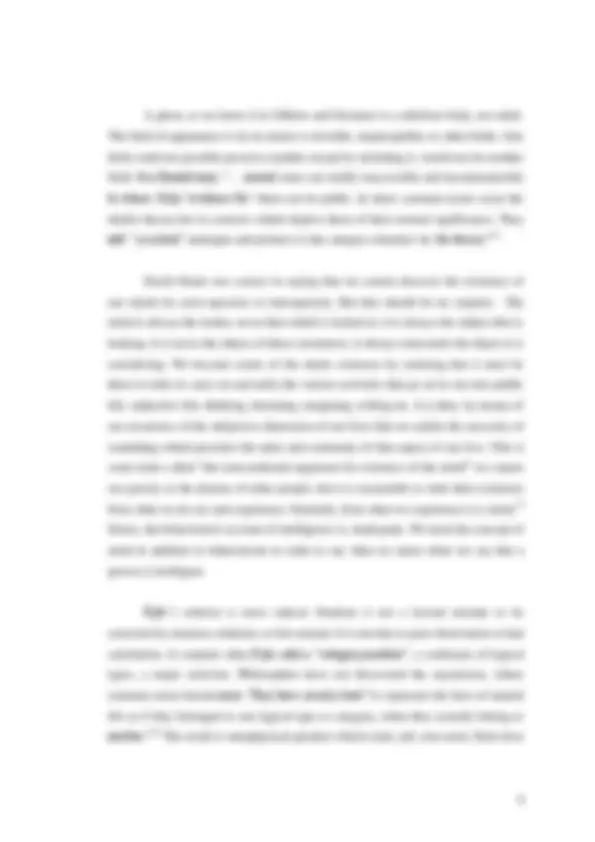
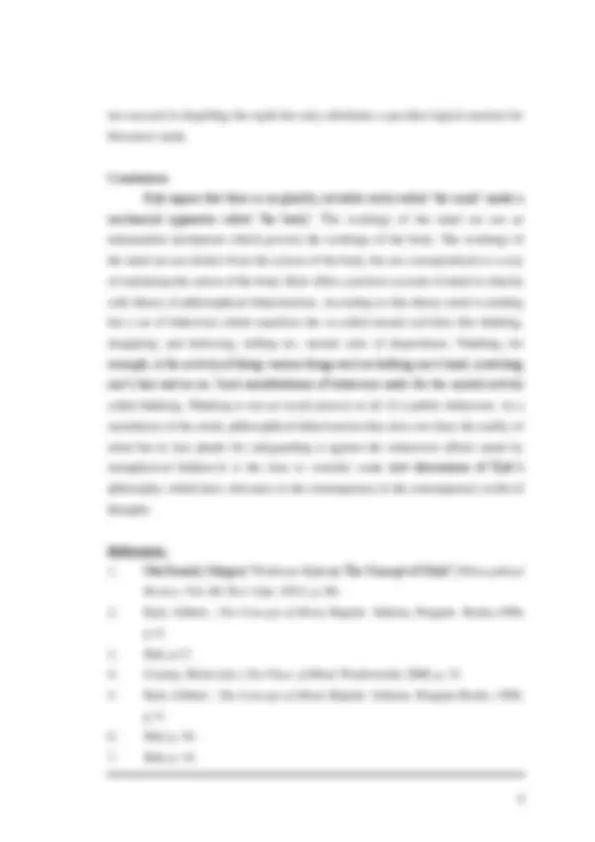
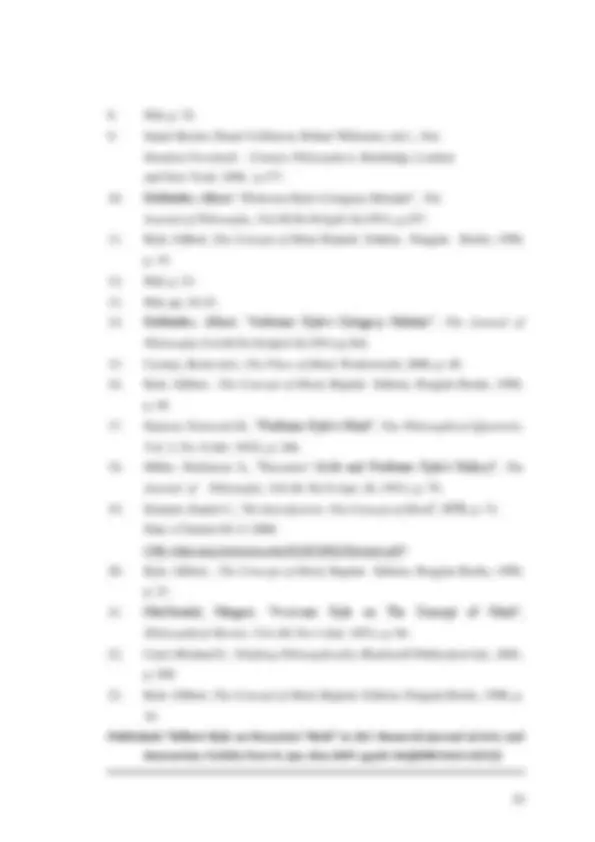


Study with the several resources on Docsity

Earn points by helping other students or get them with a premium plan


Prepare for your exams
Study with the several resources on Docsity

Earn points to download
Earn points by helping other students or get them with a premium plan
Community
Ask the community for help and clear up your study doubts
Discover the best universities in your country according to Docsity users
Free resources
Download our free guides on studying techniques, anxiety management strategies, and thesis advice from Docsity tutors
Gilbert Ryle on Descartes' myth in explain the concept of mind.
Typology: Summaries
1 / 10

This page cannot be seen from the preview
Don't miss anything!







Abstract: The aim of this paper is to critically examine the Ryle's conception of “Descartes Myth”. Ryle has two objectives in his book The Concept of Mind : (i) to refute a current philosophical theory about mind. (ii) to substitute at least in blue print, a satisfactory alternative. This paper gives a descriptive analysis of what Ryle calls Descartes-Myth and arguments for it. Conclusion of this paper drawn as he does not succeed in dispelling the myth but only substitutes a peculiar logical monism for Descartes’ Myth.
Introduction: One of the things, which those who take up the study of philosophy hope to have speedily solved the problem about soul or the mind. Non-philosophers particularly, who are not acquainted with the folkways of academic philosophy often assume that philosopher must occasionally achieve results, like other disciplines do. Having read about Ryle’s famous doctrine known as category-mistake, they just jump on the conclusion that Ryle must have exposed, and definitively identified, and proved why the “category-mistake” is a kind of mistake. This confusion of logical categories may be seen in other theories of the relation between mind and matter. For example, the idealist theory of mind makes a basic category-mistake by attempting to reduce physical reality to the same status as mental reality, while the materialist theory of mind makes a basic category-mistake by attempting to reduce mental reality to the same status as physical reality. We will discuss here Ryle’s views in details.
Ryle’s Views on Descartes’ Myth: Ryle's book The Concept of Mind (1949) is a prolonged attack on Cartesian dualism which Ryle mockingly labels it “the official doctrine” or “the dogma of ghost in the machine.” In his book Ryle has two objectives: (i) to refute a current philosophical theory about mind.
(^) Research Scholar (ICPR-JRF), Department of Philosophy, Kurukshetra University, Kurukshetra.
(ii) to substitute at least in blue print, a satisfactory alternative.^1 Ryle says that his interest lies in drawing in the 'logical geography' of mental- conduct concepts, not in the construction of a theory involving such concepts. In his own words, “The philosophical arguments which continued this book are intended not to increase what we know about minds, but to rectify the logical geography of the knowledge which we already possess.” 2 Again he said, “…my plea that I aim at doing nothing more than rectify the logic of mental-conduct concepts will probably be disallowed as mere subterfuge.”^3
Ryle makes clear in the introduction itself to his book that his analysis of the concept of mind is intended as a demonstration of the proper task of philosopher. As he sees it, philosophers have always concerned themselves with the subject (like right and wrong, mind and body & freedom and truth) which are also the topics much of our ordinary discourse as we go about the business of living in human society.^4 Most people have no problems making sense with the concept mentioned; but for a philosopher, it takes special care and skill to make sense about these concepts. This later use, reflective use of language, the talk about talk(thinking about thinking), is philosophy. It can be done more or less well with more or less awareness of exactly what sort of thing one is doing. In Ryle's own words, “Many people can talk sense with concept, but cannot talk sense about them; they know by practice how to operate with concepts, any how inside familiar fields, but they cannot state the logical regulations governing their use. They are like people who know their way about their own parish but cannot construct or read a map of it, much less a map of the region or continent in which their parish lies.”^5
Ryle discusses the category-mistake in chapter-1 entitled "Descartes' Myth". What is a myth? Describing it Ryle says, “It is the presentation of facts belonging to one category, in the idioms appropriate to another. To explode a myth is accordingly not to deny the facts but to re-allocate them, and this is what I am trying to do.”^6
He starts his argument with description of the myth of “the dogma of the ghost in the machine” or “the official doctrine.” Ryle wants to show that Descartes had
but that is true for many of our most important concepts, such as love, justice or beauty. We do not, therefore, conclude that there is no such thing as love or justice or beauty. Further, it is clear that a human mind is a thing which experiences, remembers, desires, believes, questions, reasons and wills. We have no trouble in understanding what each of those things is, so we should have no trouble in understanding the concept of the mind that has capacities of engaging in all those activities.
Albert Hofstadter says, “He (Ryle) is convinced that the dualism of the Cartesian sort, of which he confesses himself a quantum victim, is a big mistake. A person's mind is not an entity but the manner, style, or way he behaves. It is not another person behind the façade of conduct, another world beyond the ordinary world, another set of operations shadowing those of ordinary life, or a special instrument with which certain things are done. It is a matter of a person's tendencies and abilities to do certain sort of things, of the ways in which he does such things. Ryle never wearing of making this point, which is the central point of the book.”^10
Ryle makes a mistake of supposing that dualism is, by its very nature, primarily interesting in giving a descriptive differentiation of intelligent and analogous behaviour from their opposition. And, so he misread, the intention of Descartes' theory of mind.
Ryle gives the cause of why people do these mistakes, “The theoretically interesting category-mistakes are those made by people who are perfectly competent to apply concepts, at least in the situations with which they are familiar, but are still liable in their abstract thinking to allocate those concepts to logical types to which they do not belong.”^11
About the origin of the category mistake Ryle accounts the intellectual origin of the dualistic “category-mistake”. Ryle says that, Descartes mistook the logic of his problem: “Instead of asking by what criteria intelligent behaviour is actually distinguished from non-intelligent behaviour, he asked, ‘Given that the principle of
mechanical causation does not tell us the difference what other causal principle will tell it us ?’ He realized that the problem was not one of mechanics and assumed that it must therefore be one of some counterpart of mechanics. Not unnaturally psychology is often cast for just this role.”^12
And behind this mistake the author informs us, was Descartes anxiety, about the status of human nature. Accepting the approach to nature of seventeenth-century mechanism, Descartes yet wanted to save from it the religious and moral life of man. He, therefore, supposed that the difference between intelligent and unintelligent human behaviour lay in their causation, not in their overt characteristics.
According to Ryle, “It will also follow that both Idealism and Materialism are answers to an improper question. The 'reduction' of the material world to mental and processes, as well as the 'reduction' of mental states and processes to physical states and processes, presuppose the legitimacy of the disjunction 'Either there exist minds or there exist bodies (but not both) …. Either she bought a left-hand and right-hand glove or she bought a pair of glove (but not both).”^13 It occurs immediately to anyone that dualism is much older than Descartes' going back a good way. It occurs to Ryle too, so he adds an historical note.
Albert Hofstadter says, “Professor Ryle' s contention is not merely historical. He is trying to tell us that there is something wrong with the mentalistic concept of mind. There may very well be. But it is not that in using it we are compelled to, commit a category-mistake. We would be committing such a mistake if we thought we were giving a descriptive differentiation of intelligent from non-intelligent behavior by means of it. But if we do not think this, we have not done what the author says we have and so far there is no mistake.”^14
Brain Cooney says, “Ryle's verificationism leads to a Philosophical behaviourism, a denial that there is mind or domain of mental events distinct from the behavior which it causes. Because his behaviorism follows from his analysis of the
What Ryle has succeeded in doing is to reduce the empire of the mind over a considerable area. This is an important achievement, and one that is brilliantly affected, but it does not fulfill. Ryle's protested intention of entirely exorcizing of the ghost or that it has been curtained, but it still walks, and some of us are still haunted by it.^19 Ryle’s says , “Minds are not merely ghosts harnessed to machines, they are themselves just spectral machines. Though the human body is an engine, it is not quite an ordinary engine, since some of its workings are governed by another engine inside it-this interior governor-engine being one of a very special sort. It is invisible, inaudible and it has no size or weight.”^20
If we were dualist then we would say that we did not introduce mental occurrences, faculties and so on in order to distinguish between intelligent and non- intelligent, purposive and non-purposive behavior. We would say that we are supposing that there is an incorporeal entity or a principle, which we call the 'mind' or 'soul' because we do not see how one can explain the distinction in any other way. This, in fact, is exactly what is done by a real dualist like McDougall in, his book Body and Mind.
After reading about some negative responses I want to add something. It will help us to understand Ryle's fallacy. Let me explain the term ghost. Ryle has misused this word. A ghost is something that appears, however nebulous it may be and however likely to evoke the exclamation, “Whence and what art thou, questionable shape?” another name for it is an apparition. Consciousness does not appear. It is not an object. The only way to know it as similarly the experience of another. Then a question arises: If it does not appear, then why do you think that it exists? There is no problem with regard to the existence of the mind. Descartes pictures out that each of us is essentially a thinking being. I am a thinking thing, and so are you. It may be an illusion that you have a body, but it cannot be an illusion that you are a thinking thing and that is what a mind is. Hence, each of us knows that at least one mind exists-our own. Further, whenever you think you exist, you must exist.
A ghost, as we know it in folklore and literature is a nebulous body, not mind. The field of appearance is by its nature is invisible, imperceptible, to other fields. One field could not possibly perceive another except by including it, would not be another field. MacDonald says, “….mental states are totally inaccessible and incommunicable to others. Only ‘evidence for’ them can be public. In short, common terms occur the dualist theory but in contexts which deprive them of their normal significance. They add “pointless” analogies and pictures to the category-mistakes' in .the theory.”^21
David Hume was correct in saying that we cannot discover the existence of our minds by extro-spection or introspection. But that should be no surprise. The mind is always the looker, never that which is looked at; it is always the subject that is looking. It is never the object of direct awareness; it always transcends the object it is considering. We become aware of the minds existence by realizing that it must be there in order to carry on and unify the various activities that go on in our non-public life, subjective life; thinking, dreaming, imagining, willing etc. It is then, by means of our awareness of the subjective dimension of our lives that we realize the necessity of something which provides the unity and continuity of that aspect of our live. This is some times called "the transcendental argument for existence of the mind” we cannot see gravity or the dreams of other people, but it is reasonable to infer their existence from what we do see and experience. Similarly, from what we experience it is mind.^22 Hence, the behaviourist account of intelligence is, inadequate. We need the concept of mind in addition to behaviorism in order to say what we mean when we say that a person is intelligent.
Ryle’s solution is more radical. Dualism is not a factual mistake to be corrected by monism, trinitism, or fort oneism. It is not due to poor observation or bad calculation. It commits what Ryle calls a “category-mistake”, a confusion of logical types, a major solecism. Philosophers have not discovered the mysterious, where common sense knows none. They have merely tried “to represent the facts of mental life as if they belonged to one logical type or category, when they actually belong to another.”^23 The result is metaphysical paradox which some call, non-sense. Ryle does
Published: “Gilbert Ryle on Descartes’ Myth” in K.U. Research Journal of Arts and Humanities , Vol.XLI, Part-II , Jan.-Dec.2007, pp.81-86.(ISSN 0454-6952)